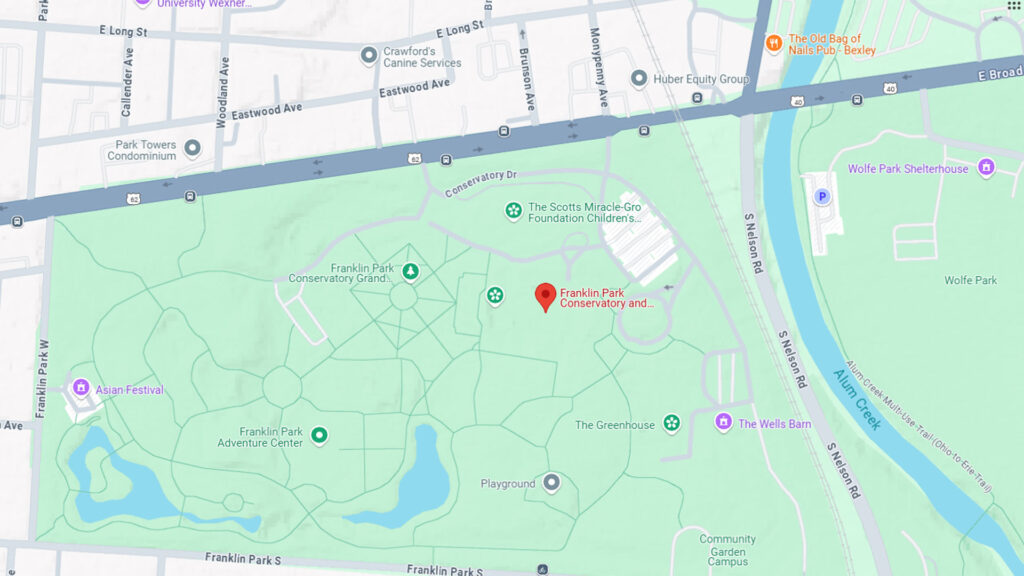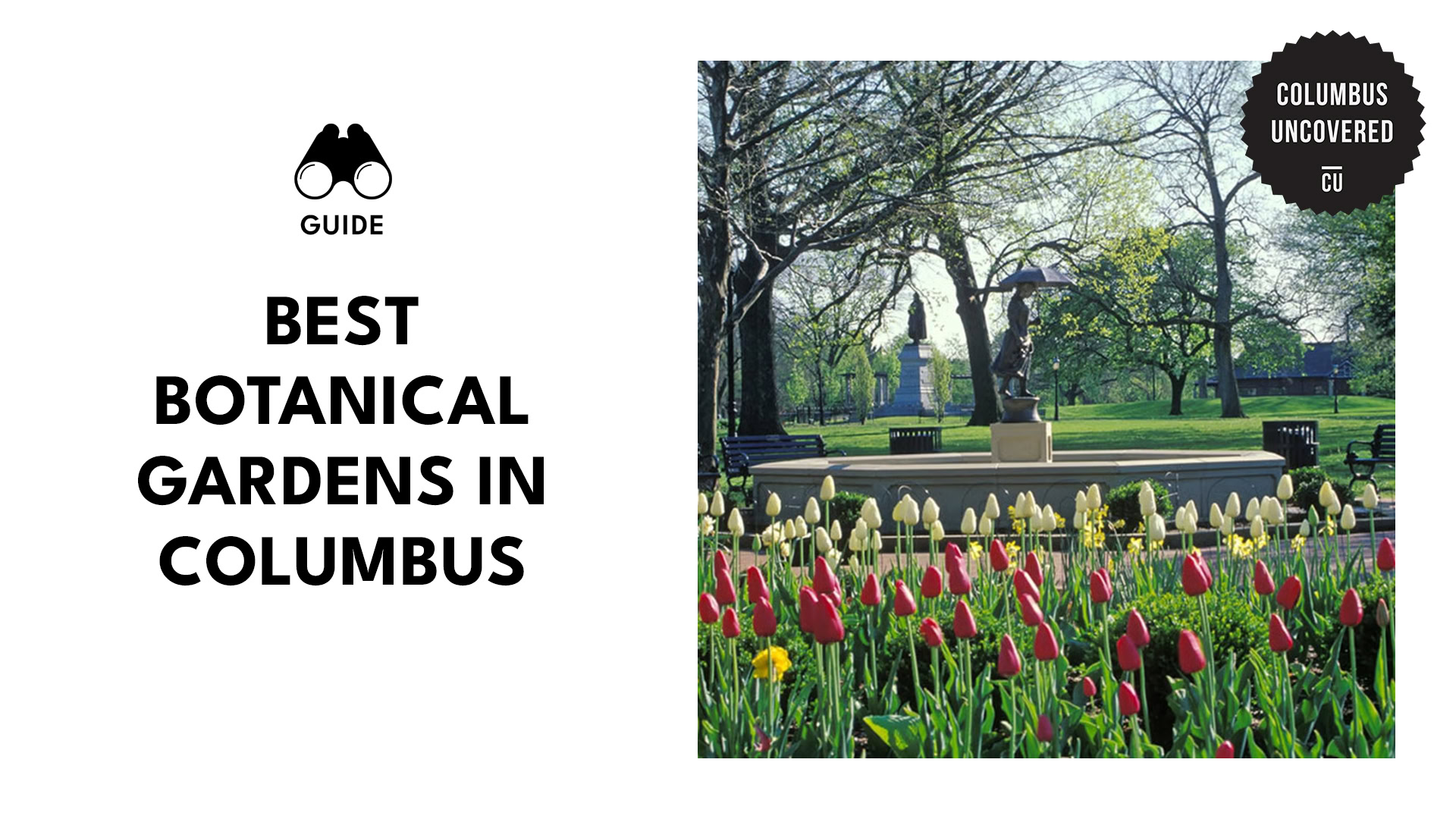I can imagine the words ‘nature and cultural attractions’ written on a tourist’s itinerary. Come spring, locals are likely looking forward to seeing flowers in full bloom, while parents dress their kids for a day of fun and learning outdoors.
In other words, at some point, we all have plans to visit a botanical garden. And since that doesn’t really happen often, you’d want to know the best ones, the highlights of each, and some visitor tips, like how to get there or the ideal times to arrive.
You’ll find all of that here. Even better, you don’t have to choose—we’ll focus solely on the one and only Franklin Park Conservatory, home to the best botanical gardens in Columbus, with stunning plant collections, art exhibits, and seasonal events.
Where is Franklin Park Conservatory and Botanical Gardens?

The Franklin Park Conservatory is located just east of downtown Columbus. It sits within Franklin Park and is bounded by East Broad Street to the south, along with residential neighborhoods surrounding it on the north, east, and west.
How to Get to Franklin Park Conservatory and Botanical Gardens
Closest Bus Stop: To get to Franklin Park Conservatory and Botanical Gardens on public transit, hop on the COTA bus and take Route 10 or 11. Exit at the stop near East Broad Street and Franklin Park, then walk a short distance to the main entrance at 1777 E. Broad Street.
Best Time to Go to Franklin Park Conservatory and Botanical Gardens
Franklin Park Conservatory and Botanical Gardens is a year-round destination, but the best time to visit really depends on what you want to see. For instance, spring brings the Blooms & Butterflies exhibit, while fall is a favorite for the Pumpkin Patch and Harvest Festival.
But if we’re talking quiet visits and fewer crowds, weekdays and early mornings are your best bet. Special events and festivals often draw more visitors, so either plan ahead to avoid the hustle or happily join in the buzz!
What to Do and See in Franklin Park Conservatory and Botanical Gardens
Explore the Highlights of the Botanical Gardens
Indoor Biomes
Media credit: fpconservatory
The indoor biomes at Franklin Park Conservatory and Botanical Gardens give you a chance to explore the planet’s natural diversity all in one place. You’ll see that each one recreates a specific ecosystem, complete with plant species adapted to those conditions.
If you’re a plant lover like me, every biome is a dream come true. To show you why, here’s a table comparing all the biomes—from the Himalayan Mountains to the Pacific Islands—along with a brief description, the plants you’ll find, and the best times to experience them:
| Biome | Description | Plants | Best Time to Experience |
| Himalayan Mountains | Cool, rocky environment with the fragrance of Star Jasmine in June and vibrant colors in fall | Conifers, deciduous trees, flowering plants, vines | Year-round |
| Rainforest | Warm and humid, tropical atmosphere | Mahogany, cacao, palms, epiphytes | Winter |
| Desert | Hot and arid landscape | Cacti, succulents, agaves, aloe | Spring, summer |
| Pacific Islands | Multi-level biome with native flora and a koi pond | Ferns, breadfruit, banana trees, orchids | Spring, summer |
Seasonal Gardens
Media credit: fpconservatory
You’ll know it’s spring when the Conservatory bursts into color with over 140,000 tulips, daffodils, and pansies. As we like to say, ‘Spring has sprung,’ because these blooms mark the season’s arrival and add to the outdoor gardens’ beauty.
Meanwhile, if you step into the Pacific Island Water Garden from late February to early July, consider yourself transported to a tropical paradise. During this time, you can witness hundreds of exotic butterflies fluttering freely through the air.
Winter, on the other hand, ironically brings a warm glow to the gardens. Indoors and outdoors, you’ll find everything adorned with captivating light arrangements, including synchronized light shows and immersive installations.
Outdoor Gardens
Media credit: fpconservatory
Franklin Park Conservatory has seven abundant outdoor gardens that are open for strolling and other occasional activities. Starting from the Main Entrance Gardens, you can explore all the way to The Scotts Miracle-Gro Foundation Children’s Garden.
Set within the 88 acres of Franklin Park, these gardens are always full of seasonal color and something new to discover throughout the year. To learn more about each one, check out the table below for all the details:
| Garden Name | Location | Description | Plants | Activities Available |
| Main Entrance Gardens | Main entrance | Beautifully landscaped areas and well-maintained pathways | Flowers, greenery | Photography, strolling |
| Crane Conifer Garden | Between the Conservatory and the Community Garden campus | Arranged garden beds and single specimen plants on display through four full seasons | Coniferous plants and grasses, Magnolias, Japanese Maples | Leisurely walks, seasonal events, educational programs |
| Grand Mallway | West of the John F. Wolfe Palm House | Spacious, tree-lined walkway with a relaxing ambiance | Evergreen shrubs, perennial beds | Special events, seasonal exhibits |
| Celebration Garden | Next to The Veridian | An elegant space with detailed stonework, a bubbling fountain, and a romantic swing | Blooming perennials, white redbud trees | Small ceremonies, afternoon stroll |
| Daylily Garden | South of the entry plaza | Beds of daylilies bred and registered by Ohio hybridizers | Daylilies | Photography, educational workshops |
| The Wells Barn Gardens | Next to the Conservatory’s main building | Meadow-like garden featuring wildlife attracting and sensory gardening themes | Perennials, grasses, shrubs | Educational, community events |
| The Scotts Miracle-Gro Foundation Children’s Garden | Conservatory’s grounds | Various themed areas, such as the Learning Pavilion, Tree-Top Canopy Walk, and Nature Play Zone | Ohio flora | Educational programs, family-friendly activities |
Immerse Yourself in the Arts and Exhibits
Dale Chihuly Glass Art Collection
Media credit: fpconservatory
Just a little trivia: Back in 2003, the Conservatory became the second botanical garden in the world to host an exhibit by glass artist Dale Chihuly. Thanks to a nonprofit group called Friends of the Conservatory, most of those amazing pieces were purchased to stay for good.
Placed throughout the biomes and plant collections, the colorful glass artwork will make you appreciate the connection between art and nature. There are currently 18 installations on display every day—and yes, they’re all included with your admission.
For a different perspective, visit after dark for Chihuly Nights, when the glass art is beautifully lit inside the Conservatory. You can also catch artists doing glassblowing demos (from April to December) at the Hot Shop in the North Courtyard.
Rotating Art Installations
Media credit: fpconservatory
Part of your botanical garden journey at the Conservatory is the rotating art installations often showcased at the Cardinal Health Gallery. Simply enter through the Grand Atrium, and you’ll be greeted by the works of talented artists from Columbus and around the world.
It’s included in your admission, too! Basically, this dedicated art space is all about sparking a little inspiration—giving you the chance to experience creativity and nature side by side, all in one visit.
The installations rotate throughout the year, so be sure to check out what’s currently on display here to know what to look forward to. And just so you know, every December, the beloved Gingerbread Competition takes over the Gallery with its festive entries.
Butterfly Exhibit (Spring & Summer)
Media credit: fpconservatory
This one’s related to Blooms & Butterflies, which we’ll get into later. But in the meantime, what you need to know about the Conservatory’s butterfly exhibit is that it’s a crowd favorite every spring and summer.
Unlike the occasional butterflies you encounter outdoors in a blur, this exhibit surrounds you with hundreds of exotic species. You may even spot a few landing delicately on the nectar flowers in the Pacific Island Water Garden.
It’s a heartwarming sight—seniors strolling hand-in-hand or in wheelchairs and kids with their parents excitedly pointing at butterflies nearby, all enjoying the moment together. After all, the exhibit is for all ages and is covered in the admission.
Join the Seasonal Events & Programs
Blooms & Butterflies (Spring & Summer)
Media credit: fpconservatory
For Blooms & Butterflies, you’d have to go to the Conservatory’s Pacific Islands Water Garden during the spring and summer months (February to July). This is because butterflies are most active during warm, sunny days, typically between 10:00 AM and 5:00 PM.
As mentioned earlier, this exhibit features hundreds of exotic butterflies fluttering freely. But you can also stop by the Metamorphosis Lab in the Grand Atrium to watch new butterflies emerge up close from their chrysalises and learn more about their life cycle.
Access to Blooms & Butterflies is part of the standard ticket, with special activities like creating sand art butterflies or flowers requiring a small fee. Visitors of all ages are welcome for an interactive butterfly experience!
Pumpkin Patch & Harvest Festival (Fall)
Media credit: fpconservatory
In the fall, the Conservatory’s Pumpkin Patch & Harvest Festival brings in autumn-themed decorations and activities. Prepare to see a lot of oranges and browns, as pumpkin houses (and trees), a giant overflowing cornucopia, and more adorn the outdoor gardens.
Daytime is for Harvest Blooms, while nighttime belongs to Pumpkin Aglow. On select October evenings, thousands of hand-carved jack-o’-lanterns, glowing skeletons, and a pumpkin tunnel light show brighten up your visit.
There’s also the Glass Pumpkin Patch, where you can browse or buy glass pumpkins crafted by local artists. Food trucks will be on hand with tasty treats, and for a drink, the Conservatory’s bar will be serving up specialty cocktails, mocktails, and other non-alcoholic options.
Conservatory Aglow (Winter)
Media credit: fpconservatory
Usually running from late November through early January, the winter holiday season sets the stage for the Conservatory Aglow. This evening event lets you wander through the Conservatory’s biomes and outdoor gardens illuminated by mesmerizing light installations.
You can also enjoy performances by stilt walkers, LED jugglers, and acrobats on select nights. Or, if you’d rather unwind, there are cozy, festive igloos in place at the Ahlum & Arbor Arctic Terrace—where you’ll also get a great view of the life-sized gingerbread house!
For Conservatory Aglow, you’ll need a separate ticket from general admission, and you can reserve yours now on this page. Don’t come on Christmas Eve or Christmas Day, though, as the Conservatory will be closed.
Workshops & classes
Media credit: fpconservatory
With so many workshops and classes happening at the Conservatory, we’re focusing mainly on glass art and gardening. But feel free to check out the full list here if something else catches your interest.
While most of these return each year, dates can vary, so it’s always smart to double-check the website. To keep things simple, here’s a breakdown of the workshops and classes, organized by type, specific class, description, cost, and age group:
| Type | Class | Description | Cost | Age Group |
| Glass Art | Introduction to glassblowing | Develop skills to gather molten glass from the furnace and sculpt it into simple blown shapes | $750, $680 for members | 18+ only |
| Intermediate glassblowing | $750, $680 for members | |||
| Personal glassblowing sessions | $375, $337 for members | |||
| Sizzling Saturdays vessel class | $120, $108 for members | |||
| Hummingbird feeders | $120, $108 for members | |||
| Blown ice cream bowls | $75, $68 for members | |||
| Sculpted glass paperweights | $70, $63 for members | |||
| Sculpted mushroom paperweights | $70, $63 for members | |||
| Ornament suncatchers | $66, $60 for members | |||
| Pride paperweights | $70, $63 for members | |||
| Gardening & Environmental | Earth-friendly foraging walk | Hour-long guided plant walk, focusing on edible plants growing at Franklin Park | $35, $28 for members | All ages |
| Tree talk with Ahlum & Arbor | Covers everything you need to know about Ohio’s trees | $20, $16 for members | All ages | |
| Beekeeping basics | Overview of the basics of beekeeping (hidden contents of bee boxes, social behavior of honey bees, and beekeeping safety) | $22, $18 for members | All ages | |
| Butterfly survey walk & talk | Learn how to support butterflies in your backyard and identify common Ohio butterflies | $10, $8 for members | All ages | |
| Bonsai demystified (two-week workshop) | Know the art and horticulture behind successful bonsai growing | $144, $120 for members | All ages |






